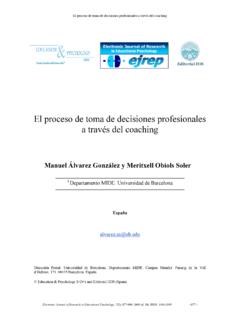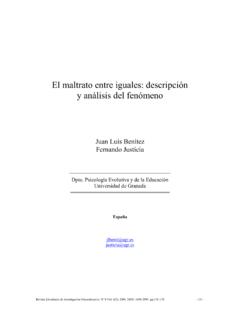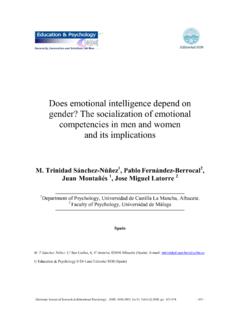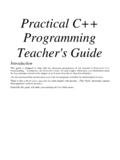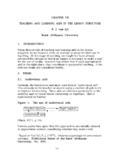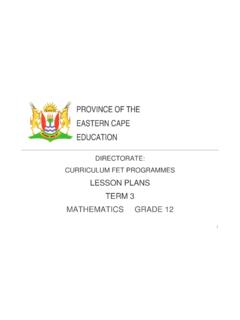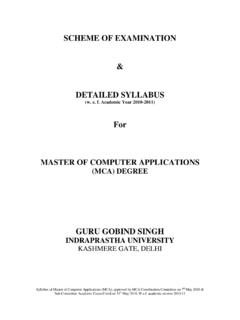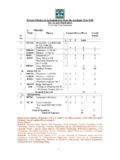Transcription of An instrument for evaluating classroom …
1 An instrument for evaluating classroom management ( qcme ) M. Luisa Mir Pozo Department of Educational Sciences University of the Balearic Islands Spain An instrument for evaluating classroom management ( qcme ) Electronic Journal of Research in Educational Psychology and Psychopedagogy, 1 (1), 67-94. ISSN: 1696-2095. - 68 - ABSTRACT Introduction. This article explains the process followed in adapting and validating a measuring instrument for evaluating classroom management . Since evaluation is important in providing information towards improving the teaching-learning process, there is a need to have useful tools available to stimulate teachers' reflection on their own action and to work on their self-evaluation habits.
2 Method. We applied an adaptation of the Questionnaire on classroom management in Early Childhood Education ( qcme ) by Nault (1994) to a sample of 247 professionals at different educational levels related to Early Childhood Education. Results. The majority of items are deemed important by more than 75% of the judges. The adapted questionnaire offers internal consistency measured by a Cronbach alpha coefficient of Additionally we obtained a good agreement index between scores assigned. Discussion. Research results allow us to identify situations considered important in early childhood classroom management based on much agreement among experts consulted.
3 They also lead us to present this instrument as a tool for use in professional development, as a help in reflection, in detection and in decision-making. The Questionnaire can be an object for personal interest, use, expansion and adaptation by its different users (students, teachers, university professors, student teaching advisers, headship teams and educational psychology guidance teams, inspectors, consultants in teacher development centers, etc.), thus contributing in the effort to better manage the teaching-learning process.
4 KEYWORDS: classroom management , classroom Organization, Early Childhood Education, EvaluationM. Luisa Mir Pozo Electronic Journal of Research in Educational Psychology and Psychopedagogy, 1 (1), 67-94. ISSN: 1696-2095. - 69 - INTRODUCTION classroom management is the first professional activity to be developed at the beginning of a teaching career, and represents the most significant difficulty to be overcome when a student teacher first begins to teach (Zabalza and Marcelo, 1993). Numerous research efforts have shown that the question of controlling classroom activity constitutes a matter of concern even for the experienced teacher, and is a decisive factor in what they set out to do (Deakin University, 1985; Doyle, 1977, 1979, 1981, 1986; Dreeben, 1973; Emmer, 1987).
5 For Gimeno Sacrist n (1988), the teacher's most immediate challenge consists of managing life for a specific group of students with activities to implement the curriculum in real space and time. According to Gair n (1996), management is an organizing function which corresponds to the function of taking action or the realm of task execution, the area of implementing school organization. It is the process of directing and organizing a class. Organization involves, first of all, deciding in advance the objectives to be reached, foreseeing resources that must be mobilized, and carrying out actions in a period of time.
6 Second, it means analyzing the action plan to determine necessary tasks and functions, as well as which members of the organization they must be assigned to. Further, it requires execution of the assigned tasks, their coordination, and evaluation of results. More specifically, organization is linked to implementation of the curriculum, to the improvement of the teaching-learning process and to better quality in educational invention. It provides tools for "doing" the curriculum, and makes possible professional development.
7 The importance of the organizational frame is substantiated by Fern ndez P rez (1991), who indicates that the conditions, circumstances, means, instruments and resources, sequences and times make possible achievement of curriculum design objectives and in practice optimize them and their specific implementation in educational settings. management also implies managing the social climate of the class (Garc a Correa, 1996), the relationship system, the enhancement of learning or the internalizing of social norms.
8 The multi-dimensional nature of managing the teaching-learning process justifies its complexity (figure 1). An instrument for evaluating classroom management ( qcme ) Electronic Journal of Research in Educational Psychology and Psychopedagogy, 1 (1), 67-94. ISSN: 1696-2095. - 70 - SCIENTIFIC Different: - research paradigms - referential theoretical models - pedagogical conceptions - psychological theories DIMENSIONS OF MANAGING THE TEACHING-LEARNING PROCESS SOCIAL - relationship system, attitudes and values - communication, participation.
9 Interaction - internalization of social norms - organization of the work environment PSYCHO-EDUCATIONAL - curriculum development - educational plan - teaching-learning process - educational intervention - teaching strategies in the classroom Figure 1. Dimensions of managing the teaching-learning process M. Luisa Mir Pozo Electronic Journal of Research in Educational Psychology and Psychopedagogy, 1 (1), 67-94. ISSN: 1696-2095. - 71 - Coll (1986) places "curriculum" somewhere between the statement of general principles and their translation into practice, between educational theory and pedagogical practice, between planning and action, between what is prescribed and what actually takes place in the classroom .
10 In the Spanish curriculum, the educational plan developed at each school is a management instrument that lists and defines features of the school's identity, formulates objectives and expresses the organizational structure of the institution (Ant nez, 1987). The lesson program developed by each teacher in order to guide classroom tasks represents the instructional units. From this we understand curriculum as a decision space from which the administration, the school community and the teachers articulate their respective frameworks of intervention.


